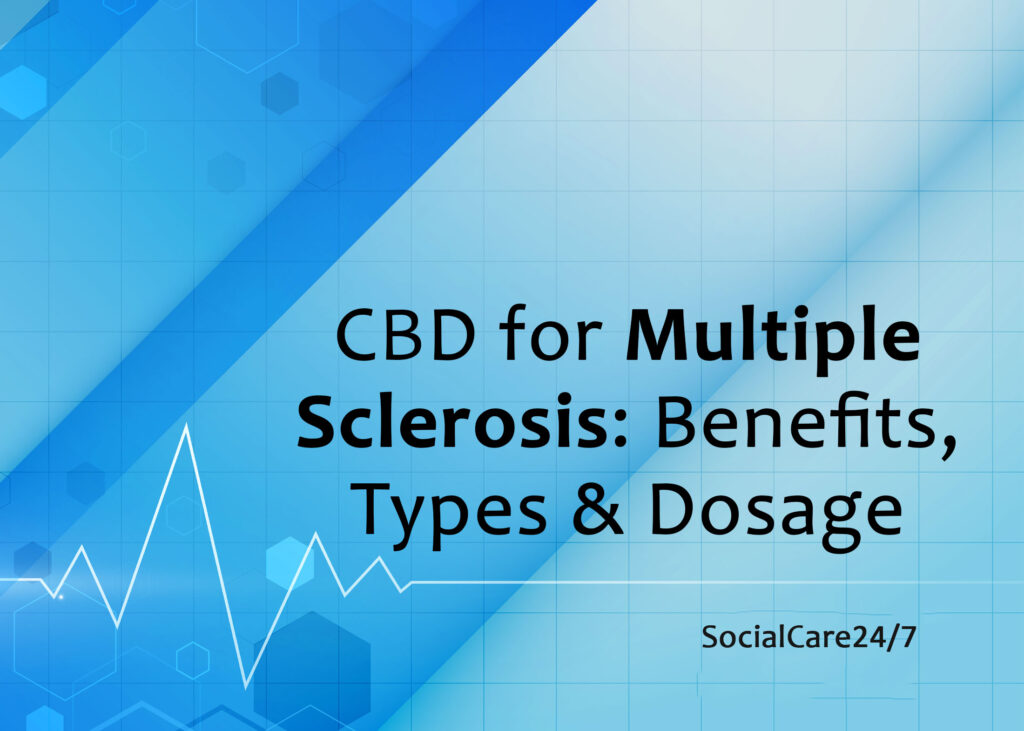As Multiple Sclerosis symptoms vary, they often influence quality of life. The non-psychoactive cannabis component CBD helps some MS sufferers control symptoms. CBD may improve MS symptoms, including pain and stiffness, but experts are still investigating it.
In this article, we discuss CBD for MS (multiple sclerosis), including benefits, safety, and dose.
Benefits of CBD for MS
A recent meta-analysis found that cannabinoids, including CBD, are “probably effective” at treating MS symptoms like pain and spasticity but “probably not effective” at treating muscle tremors or incontinence.
Additional study supported CBD for MS. Some key findings:
- CBD supplementation improved MS mobility and lowered pain, exhaustion, inflammation, depression, and stiffness, according to a 2018 study. The authors recommended CBD supplementation for MS patients.
- CBD nasal spray Sativex (nabiximols), reduces MS pain, stiffness, and urine, according to a 2014 study.
- CBD regulates the immune system in animal models, lowering MS-related autoimmune responses, according to two 2021 medical evaluations. Future research may allow cannabis-derived drugs like CBD to treat MS progression, not only symptoms.
How Can CBD Help MS?
MS patients often use cannabidiol to alleviate symptoms. CBD relieves chronic physical pain and symptoms quickly and effectively. This makes this medication similar to opioids and other habit-forming medicines that blind brain receptors and lessen pain.
Cannabis’ anti-inflammatory actions reduce nervous system discomfort. CBD and THC can treat autoimmune illnesses like MS.
Symptom relief for MS may be new to you. Gummies, balms, or CBD oil—it doesn’t matter. The active components soothe the endocannabinoid system after use. The central nervous system (CNS) includes the ECS, which controls brain function.
This means CBD products have two benefits:
- Increase anti-inflammatory cytokines; inhibit T-cell induction.
- Cannabidiol products reduce fatigue, edoema, and discomfort.
Multiple Sclerosis CBD Types
Cannabidiol occurs in several forms. Many products include this chemical, and there are many ways to utilize it to treat multiple sclerosis. There are several ways to consume CBD for MS:
- Oils
CBD oil is the most prevalent form of CBD. You can swallow oil drops by placing them under your tongue. You can also use cannabidiol oil in your diet in place of conventional oil.
- Gummies
CBD gummies are perfect for pill-resistant folks. Pills may be better for serious illnesses, but not everyone likes taking them. Different-flavored gummies will gratify you.
- Balms and creams
CBD lotions and balms are also available. Rub cannabidiol on your skin for muscular or joint discomfort or skin issues.
- Dietary supplement
A daily food supplement is another fantastic method to take CBD. You can add it to food or drinks or take oral pills or sprays, but you should check with your doctor first.
CBD dosage for MS
CBD does not affect the mind and is safe. CBD at 300 mg every day is safe for six months. Higher doses are safe for less time.
Some people may have negative effects with CBD, like any supplement or prescription. They may include:
- Drowsiness
- Lightheadedness
- Blood pressure low
- Liver damage
Additionally, CBD may interact with several prescription medicines. Consult your doctor before taking CBD, especially if you’re pregnant or breastfeeding. At least 20% of MS patients use CBD. Thus, most MS specialists are familiar with it.
THC-containing cannabis is federally prohibited in the US, whereas CBD is permitted. Be aware of the legal and professional repercussions of consuming CBD, especially if you are drug-screened regularly.
Remember that the FDA does not regulate CBD supplements, so buy from a trusted supplier.
Treatment of MS Symptoms with CBD
Each MS patient has different symptoms and treatment options. Please consult your doctor before using CBD for MS. They can check for drug or supplement interactions.
If you reside in a state where marijuana is legal, your local dispensary can provide CBD use information if your MS healthcare practitioner doesn’t or you’re uncomfortable talking to them.
Over-the-counter (OTC) CBD products are not FDA-regulated, and there is little guidance in the US on how much CBD to take for specific symptoms and ailments.
People should start with lesser doses and increase them until they get results. The average daily dose of nonprescription CBD is 200 mg, not MS-specific.13 For 13 weeks, it’s safe.
How to Buy MS CBD
Buying CBD for MS from trusted dispensaries is crucial. Consider these factors while buying CBD for MS:
- CBD legality in your state, including medicinal cannabis card requirements
- CBD may affect your professional licenses and other areas of life.
- CBD aims and symptoms you want to treat
- Whether you want CBD isolate or a full-spectrum product with other cannabinoids,
- License of the retailer in your state
- Grown product source
- Has a COA or certificate of analysis showing the product’s chemical composition?
Choosing Quality Items
The FDA does not regulate nonprescription CBD. This suggests product quality needs to be standardized. Finding reliable CBD sources is crucial.
Mislabeled products may contain more or less CBD. Products may contain pesticides, heavy metals, moulds, and bacteria due to a lack of regulation.
Ask your doctor about reliable cannabis companies. They may direct you. If marijuana is legal in your state, your dispensary may have professionals to advise you.
Consider researching the brands your local dispensary sells. Cannabis companies often reveal their sources and independent purity studies on their websites.
Conclusion
CBD influences the body through the endocannabinoid system, which controls several processes. CBD helps MS symptoms include pain, tiredness, stiffness, inflammation, and depression. CBD has many benefits, but it might cause drowsiness and appetite changes.
Discuss it with your doctor and pharmacist because it may interfere with other drugs or supplements. Topical or oral applications are available. Since over-the-counter CBD is not FDA-regulated, it’s crucial to discover reliable sources to minimize side effects.



